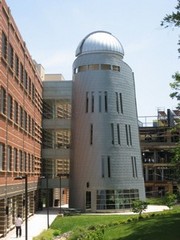Doctor of Philosophy in PhysicsSchool of Physics, Astronomy, and Computational Sciences |
|
Program OverviewThe mission of the Physics PhD program offered by the Department of Physics and Astronomy is to train the next generation of research physicists in academia, industry, and government. Graduates of the program will have learned to carry out independent and innovative scientific research in physics and astronomy. Our faculty members are dynamic, well-known in their fields, highly productive in research, and student-oriented. Students within our program will have the opportunities to research in many cutting-edge fields in applied physics, astrophysics, atomic physics, atmospheric and ionospheric physics, biological physics (including neuroscience and biomedical physics), condensed matter physics, elementary particle physics, materials science, nonlinear dynamics, nuclear physics, planetary science, and space weather & plasma astrophysics. What are some questions investigated by GMU faculty and students in their research?
How can we find evidence for ancient or recent Martian life? Why pursue an PhD in physics at Mason?+ There are great opportunities to do cutting-edge research with more than 40 physicists and astronomers in applied physics, astrophysics, atomic physics, atmospheric and ionospheric physics, biological physics (including neuroscience and biomedical physics), condensed matter physics, elementary particle physics, materials science, nonlinear dynamics, nuclear physics, planetary science, and space weather & plasma astrophysics. + We offer graduate teaching and research assistantships for qualified students. + All graduate courses are offered at times convenient for working professionals. + Employment opportunities in the Washington, D.C. metropolitan area for physicists are especially good, and our MS and PhD graduates have had success in finding jobs. + Northern Virginia is a national center for high-technology industry and federal science laboratories, with many paid internship opportunities. Current faculty have active collaborations with several of these surrounding major government facilities, including NASA's Goddard Space Flight Center, the Space Telescope Science Institute, the Naval Research Laboratory, and the National Institute of Standards and Technology. |

|
General questions and requests for additional information should be directed to Dr. Robert Weigel, the program director. |